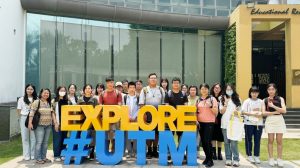Hotels are among the places often touched by human trafficking, but awareness in the hospitality business that hoteliers can help thwart the traffickers is growing. IFT is joining the fight against human trafficking by teaching students that may eventually join the hotel industry how to spot the signs that the crime is being committed.
The Institute will show a documentary film about trafficking in children, to be screened on the Mong-Há Campus at 1330 on 4 November, and then hold a discussion on the topic among students and staff. A similar session was held on the Taipa Campus in late October. The documentary is “Not My Life”. It is directed by Robert Bilheimer. It was filmed in a dozen countries on 5 continents.
The screening and discussion sessions are being arranged by IFT Lecturer Ms. Mary Eddy U.
“IFT aims to produce quality managers and future leaders in the tourism and hospitality field,” Ms. Eddy U says. “Being a good leader requires not only understanding of business operations and theories, but also ethical behaviour and critical thinking about issues affecting the industry,” she adds.
“As the call for corporate social responsibility becomes increasingly widespread, the future leaders and hospitality managers of Macao need to consider the impact of global problems like modern-day slavery,” Ms. Eddy U states.
Ms. Eddy U represented IFT at a seminar on human trafficking held in September by the Good Shepherd Centre, a shelter in Macao for women in peril. The MGM Macau integrated resort supported the seminar. The event brought together figures in the Government, in the hotel industry, in the social services and in institutions of secondary and tertiary education in Macao.
“Not My Life” was shown at the seminar, and afterwards a representative of the Human Trafficking Deterrent Measures Concern Committee, Mr. Cheang Kam Va, made some remarks. Judiciary Police Director Mr. Chau Wai Kuong talked about some of the difficulties the police have in detecting victims of human trafficking and in prosecuting the traffickers.
The seminar then discussed ways to help the victims. Representatives of the Social Welfare Bureau and Good Shepherd Centre spoke of some of the experiences they have had in helping victims. One victim, a young woman, told her story, described the effect her ordeal had had on her, and related how she has been able, with the help of various people, to rebuild her life.
Be vigilant
Ms. Eddy U says IFT students should be on the lookout for 2 things if they eventually join the hotel industry or the events industry. “Those responsible for procuring items for events, renovation or hotel decoration should make efforts to ensure that the items they are purchasing were not produced under sweatshop conditions,” she says. “If the focus is only on the bottom line, without concern for how the products are made, children will continue to be enslaved to produce them.”
IFT alumni in the hospitality business also should be aware that prostitutes may be victims of human trafficking, Ms. Eddy U adds. “Although prostitution is legal in Macao, it is illegal to pimp prostitutes, such as those being held against their will, or to earn money from organising prostitution rings,” she says. “Thus, those in the hotel industry should be particularly vigilant.”
Hotel employees in Macao can report to the police any suspicions they have about human trafficking by calling (+853) 2888 9911, the dedicated hotline number. “IFT interns and alumni should be aware of this means of reporting, and be resolute in reporting any situation that they suspect may involve human trafficking,” Ms. Eddy U says.









